How AI-driven Surveys Impact Job Roles in Market Research Agencies
How AI-driven Surveys Impact Job Roles in Market Research Agencies
How AI-driven Surveys Impact Job Roles in Market Research Agencies



Ever wondered how businesses stay ahead of the curve in a cutthroat market? The role of a market research agency is inevitable for business success —the secret sauce behind strategic decisions, product launches, and customer insights. These agencies are the Sherlock Holmes of the business world, unraveling mysteries through data, empathy, and keen analysis. From understanding consumer behaviors to predicting industry trends, they're the unsung heroes behind every successful campaign and innovation.
The Eclectic Cast of Market Research
Market research agencies focus not just on numbers and surveys—it’s a symphony of roles that blend science with storytelling, data with empathy.It operates by gathering, analyzing, and interpreting data to provide businesses with actionable insights. Here are the various roles that collaborate to achieve outstanding outcomes:
Data Analysts crunch numbers and uncover trends.
Qualitative Researchers delve into consumer behaviors and motivations.
Market Research Analysts strategize based on insights.
Survey Researchers design and optimize surveys for data collection.
Trend Analysts forecast market shifts.
Account Managers liaise with clients to ensure research meets objectives.
Each role plays a crucial part in delivering comprehensive market intelligence, guiding businesses in decision-making, product development, and competitive strategy.
The Data Diviners (Data Analysts/Researchers)
Meet the wizards of spreadsheets and masters of statistical analysis. Data diviners turn raw numbers into actionable insights faster than you can say "correlation." Their knack for crunching mountains of data reveals patterns that drive strategic decisions and business growth.
Data analysts leverage AI to sift through vast datasets swiftly, extracting meaningful insights efficiently. AI-driven analytics tools assist in identifying trends and correlations, allowing analysts to focus on interpreting data rather than mundane tasks.
The Insight Investigators (Qualitative Researchers)
These are the empathy whisperers who dive deep into consumer minds. Through interviews, focus groups, and ethnographies, they decode motivations, uncover trends, and unearth those "aha!" moments that shape brands’ strategies. With a blend of psychology and intuition, they bring human stories to life through research.
Qualitative researchers benefit from AI in several ways. AI-powered sentiment analysis tools mine qualitative data from social media, reviews, and open-ended survey responses. This automation helps researchers uncover nuanced consumer sentiments and preferences, enriching qualitative insights.
The Strategists (Market Research Analysts)
Think of them as the architects behind the scenes. Strategists connect consumer insights with business goals, crafting strategies that launch products and navigate market complexities. They’re the Sherlock to the qualitative researcher’s Watson, turning insights into action with precision and foresight.
Strategists integrate AI-generated insights into strategic planning and decision-making processes. AI's predictive analytics capabilities forecast market trends and consumer behavior shifts, empowering strategists to develop proactive strategies that anticipate market changes.
The Survey Sultans (Survey Researchers)
Ever wondered who designs those engaging online questionnaires? Enter the survey sultans. They craft surveys that extract precise information on customer satisfaction, product feedback, and more. With a mix of psychology and UX design, they ensure surveys are not just answered but enjoyed.
AI assists survey researchers in designing surveys that optimize respondent experience and data quality. Automated survey platforms analyze respondent feedback in real-time, enabling researchers to adapt survey questions dynamically based on initial responses.
The Trend Trackers (Market Trend Analysts)
Always ahead of the curve, trend trackers scan the horizon for emerging shifts in tech, consumer behavior, and beyond. Armed with foresight and analytical prowess, they help brands stay relevant and seize opportunities in dynamic markets.
AI augments trend trackers' ability to monitor and forecast market trends accurately. Machine learning algorithms process real-time data from diverse sources, enabling trend trackers to identify emerging trends swiftly and advise businesses on market opportunities.
The Client Whisperers (Account Managers)
The bridge between agency and client, these experts speak fluent client-ese. They ensure research projects meet expectations, deadlines are kept, and budgets are managed with finesse. With charm and negotiation skills, they keep clients happy and projects on track.
Account managers leverage AI-driven insights to enhance client relationships and project management. AI automates reporting processes, generating customizable dashboards and visualizations that succinctly communicate research findings to clients.
The Qualitative Researcher: Unveiling the Sherlock of Market Research
At the heart of empathy and curiosity lies the qualitative researcher. They decode human behavior, uncover hidden motivations, and transform insights into compelling narratives that guide brands toward success. Empathy is their superpower—they listen not just to words, but to the emotions and stories behind them.
Conclusion: Market Research Agencies & AI-driven Qualitative Surveys
Market research agencies are the engines driving business innovation and growth. With their blend of data analysis, consumer empathy, and strategic foresight, they empower businesses to make informed decisions in a competitive landscape. The roles within these agencies—from data diviners to client whisperers—are behind every successful campaign and product launch.
AI-driven surveys represent a paradigm shift in how market research agencies operate and deliver value to businesses. By automating repetitive tasks, enhancing data accuracy, and providing deeper insights, AI empowers market research professionals across all job roles to elevate their strategic contributions.
As AI continues to evolve, its integration into market research workflows will likely redefine industry standards, making agencies more agile, insightful, and indispensable in shaping business success in a rapidly evolving marketplace. Sign-up for our demo today!
Ever wondered how businesses stay ahead of the curve in a cutthroat market? The role of a market research agency is inevitable for business success —the secret sauce behind strategic decisions, product launches, and customer insights. These agencies are the Sherlock Holmes of the business world, unraveling mysteries through data, empathy, and keen analysis. From understanding consumer behaviors to predicting industry trends, they're the unsung heroes behind every successful campaign and innovation.
The Eclectic Cast of Market Research
Market research agencies focus not just on numbers and surveys—it’s a symphony of roles that blend science with storytelling, data with empathy.It operates by gathering, analyzing, and interpreting data to provide businesses with actionable insights. Here are the various roles that collaborate to achieve outstanding outcomes:
Data Analysts crunch numbers and uncover trends.
Qualitative Researchers delve into consumer behaviors and motivations.
Market Research Analysts strategize based on insights.
Survey Researchers design and optimize surveys for data collection.
Trend Analysts forecast market shifts.
Account Managers liaise with clients to ensure research meets objectives.
Each role plays a crucial part in delivering comprehensive market intelligence, guiding businesses in decision-making, product development, and competitive strategy.
The Data Diviners (Data Analysts/Researchers)
Meet the wizards of spreadsheets and masters of statistical analysis. Data diviners turn raw numbers into actionable insights faster than you can say "correlation." Their knack for crunching mountains of data reveals patterns that drive strategic decisions and business growth.
Data analysts leverage AI to sift through vast datasets swiftly, extracting meaningful insights efficiently. AI-driven analytics tools assist in identifying trends and correlations, allowing analysts to focus on interpreting data rather than mundane tasks.
The Insight Investigators (Qualitative Researchers)
These are the empathy whisperers who dive deep into consumer minds. Through interviews, focus groups, and ethnographies, they decode motivations, uncover trends, and unearth those "aha!" moments that shape brands’ strategies. With a blend of psychology and intuition, they bring human stories to life through research.
Qualitative researchers benefit from AI in several ways. AI-powered sentiment analysis tools mine qualitative data from social media, reviews, and open-ended survey responses. This automation helps researchers uncover nuanced consumer sentiments and preferences, enriching qualitative insights.
The Strategists (Market Research Analysts)
Think of them as the architects behind the scenes. Strategists connect consumer insights with business goals, crafting strategies that launch products and navigate market complexities. They’re the Sherlock to the qualitative researcher’s Watson, turning insights into action with precision and foresight.
Strategists integrate AI-generated insights into strategic planning and decision-making processes. AI's predictive analytics capabilities forecast market trends and consumer behavior shifts, empowering strategists to develop proactive strategies that anticipate market changes.
The Survey Sultans (Survey Researchers)
Ever wondered who designs those engaging online questionnaires? Enter the survey sultans. They craft surveys that extract precise information on customer satisfaction, product feedback, and more. With a mix of psychology and UX design, they ensure surveys are not just answered but enjoyed.
AI assists survey researchers in designing surveys that optimize respondent experience and data quality. Automated survey platforms analyze respondent feedback in real-time, enabling researchers to adapt survey questions dynamically based on initial responses.
The Trend Trackers (Market Trend Analysts)
Always ahead of the curve, trend trackers scan the horizon for emerging shifts in tech, consumer behavior, and beyond. Armed with foresight and analytical prowess, they help brands stay relevant and seize opportunities in dynamic markets.
AI augments trend trackers' ability to monitor and forecast market trends accurately. Machine learning algorithms process real-time data from diverse sources, enabling trend trackers to identify emerging trends swiftly and advise businesses on market opportunities.
The Client Whisperers (Account Managers)
The bridge between agency and client, these experts speak fluent client-ese. They ensure research projects meet expectations, deadlines are kept, and budgets are managed with finesse. With charm and negotiation skills, they keep clients happy and projects on track.
Account managers leverage AI-driven insights to enhance client relationships and project management. AI automates reporting processes, generating customizable dashboards and visualizations that succinctly communicate research findings to clients.
The Qualitative Researcher: Unveiling the Sherlock of Market Research
At the heart of empathy and curiosity lies the qualitative researcher. They decode human behavior, uncover hidden motivations, and transform insights into compelling narratives that guide brands toward success. Empathy is their superpower—they listen not just to words, but to the emotions and stories behind them.
Conclusion: Market Research Agencies & AI-driven Qualitative Surveys
Market research agencies are the engines driving business innovation and growth. With their blend of data analysis, consumer empathy, and strategic foresight, they empower businesses to make informed decisions in a competitive landscape. The roles within these agencies—from data diviners to client whisperers—are behind every successful campaign and product launch.
AI-driven surveys represent a paradigm shift in how market research agencies operate and deliver value to businesses. By automating repetitive tasks, enhancing data accuracy, and providing deeper insights, AI empowers market research professionals across all job roles to elevate their strategic contributions.
As AI continues to evolve, its integration into market research workflows will likely redefine industry standards, making agencies more agile, insightful, and indispensable in shaping business success in a rapidly evolving marketplace. Sign-up for our demo today!
Ever wondered how businesses stay ahead of the curve in a cutthroat market? The role of a market research agency is inevitable for business success —the secret sauce behind strategic decisions, product launches, and customer insights. These agencies are the Sherlock Holmes of the business world, unraveling mysteries through data, empathy, and keen analysis. From understanding consumer behaviors to predicting industry trends, they're the unsung heroes behind every successful campaign and innovation.
The Eclectic Cast of Market Research
Market research agencies focus not just on numbers and surveys—it’s a symphony of roles that blend science with storytelling, data with empathy.It operates by gathering, analyzing, and interpreting data to provide businesses with actionable insights. Here are the various roles that collaborate to achieve outstanding outcomes:
Data Analysts crunch numbers and uncover trends.
Qualitative Researchers delve into consumer behaviors and motivations.
Market Research Analysts strategize based on insights.
Survey Researchers design and optimize surveys for data collection.
Trend Analysts forecast market shifts.
Account Managers liaise with clients to ensure research meets objectives.
Each role plays a crucial part in delivering comprehensive market intelligence, guiding businesses in decision-making, product development, and competitive strategy.
The Data Diviners (Data Analysts/Researchers)
Meet the wizards of spreadsheets and masters of statistical analysis. Data diviners turn raw numbers into actionable insights faster than you can say "correlation." Their knack for crunching mountains of data reveals patterns that drive strategic decisions and business growth.
Data analysts leverage AI to sift through vast datasets swiftly, extracting meaningful insights efficiently. AI-driven analytics tools assist in identifying trends and correlations, allowing analysts to focus on interpreting data rather than mundane tasks.
The Insight Investigators (Qualitative Researchers)
These are the empathy whisperers who dive deep into consumer minds. Through interviews, focus groups, and ethnographies, they decode motivations, uncover trends, and unearth those "aha!" moments that shape brands’ strategies. With a blend of psychology and intuition, they bring human stories to life through research.
Qualitative researchers benefit from AI in several ways. AI-powered sentiment analysis tools mine qualitative data from social media, reviews, and open-ended survey responses. This automation helps researchers uncover nuanced consumer sentiments and preferences, enriching qualitative insights.
The Strategists (Market Research Analysts)
Think of them as the architects behind the scenes. Strategists connect consumer insights with business goals, crafting strategies that launch products and navigate market complexities. They’re the Sherlock to the qualitative researcher’s Watson, turning insights into action with precision and foresight.
Strategists integrate AI-generated insights into strategic planning and decision-making processes. AI's predictive analytics capabilities forecast market trends and consumer behavior shifts, empowering strategists to develop proactive strategies that anticipate market changes.
The Survey Sultans (Survey Researchers)
Ever wondered who designs those engaging online questionnaires? Enter the survey sultans. They craft surveys that extract precise information on customer satisfaction, product feedback, and more. With a mix of psychology and UX design, they ensure surveys are not just answered but enjoyed.
AI assists survey researchers in designing surveys that optimize respondent experience and data quality. Automated survey platforms analyze respondent feedback in real-time, enabling researchers to adapt survey questions dynamically based on initial responses.
The Trend Trackers (Market Trend Analysts)
Always ahead of the curve, trend trackers scan the horizon for emerging shifts in tech, consumer behavior, and beyond. Armed with foresight and analytical prowess, they help brands stay relevant and seize opportunities in dynamic markets.
AI augments trend trackers' ability to monitor and forecast market trends accurately. Machine learning algorithms process real-time data from diverse sources, enabling trend trackers to identify emerging trends swiftly and advise businesses on market opportunities.
The Client Whisperers (Account Managers)
The bridge between agency and client, these experts speak fluent client-ese. They ensure research projects meet expectations, deadlines are kept, and budgets are managed with finesse. With charm and negotiation skills, they keep clients happy and projects on track.
Account managers leverage AI-driven insights to enhance client relationships and project management. AI automates reporting processes, generating customizable dashboards and visualizations that succinctly communicate research findings to clients.
The Qualitative Researcher: Unveiling the Sherlock of Market Research
At the heart of empathy and curiosity lies the qualitative researcher. They decode human behavior, uncover hidden motivations, and transform insights into compelling narratives that guide brands toward success. Empathy is their superpower—they listen not just to words, but to the emotions and stories behind them.
Conclusion: Market Research Agencies & AI-driven Qualitative Surveys
Market research agencies are the engines driving business innovation and growth. With their blend of data analysis, consumer empathy, and strategic foresight, they empower businesses to make informed decisions in a competitive landscape. The roles within these agencies—from data diviners to client whisperers—are behind every successful campaign and product launch.
AI-driven surveys represent a paradigm shift in how market research agencies operate and deliver value to businesses. By automating repetitive tasks, enhancing data accuracy, and providing deeper insights, AI empowers market research professionals across all job roles to elevate their strategic contributions.
As AI continues to evolve, its integration into market research workflows will likely redefine industry standards, making agencies more agile, insightful, and indispensable in shaping business success in a rapidly evolving marketplace. Sign-up for our demo today!
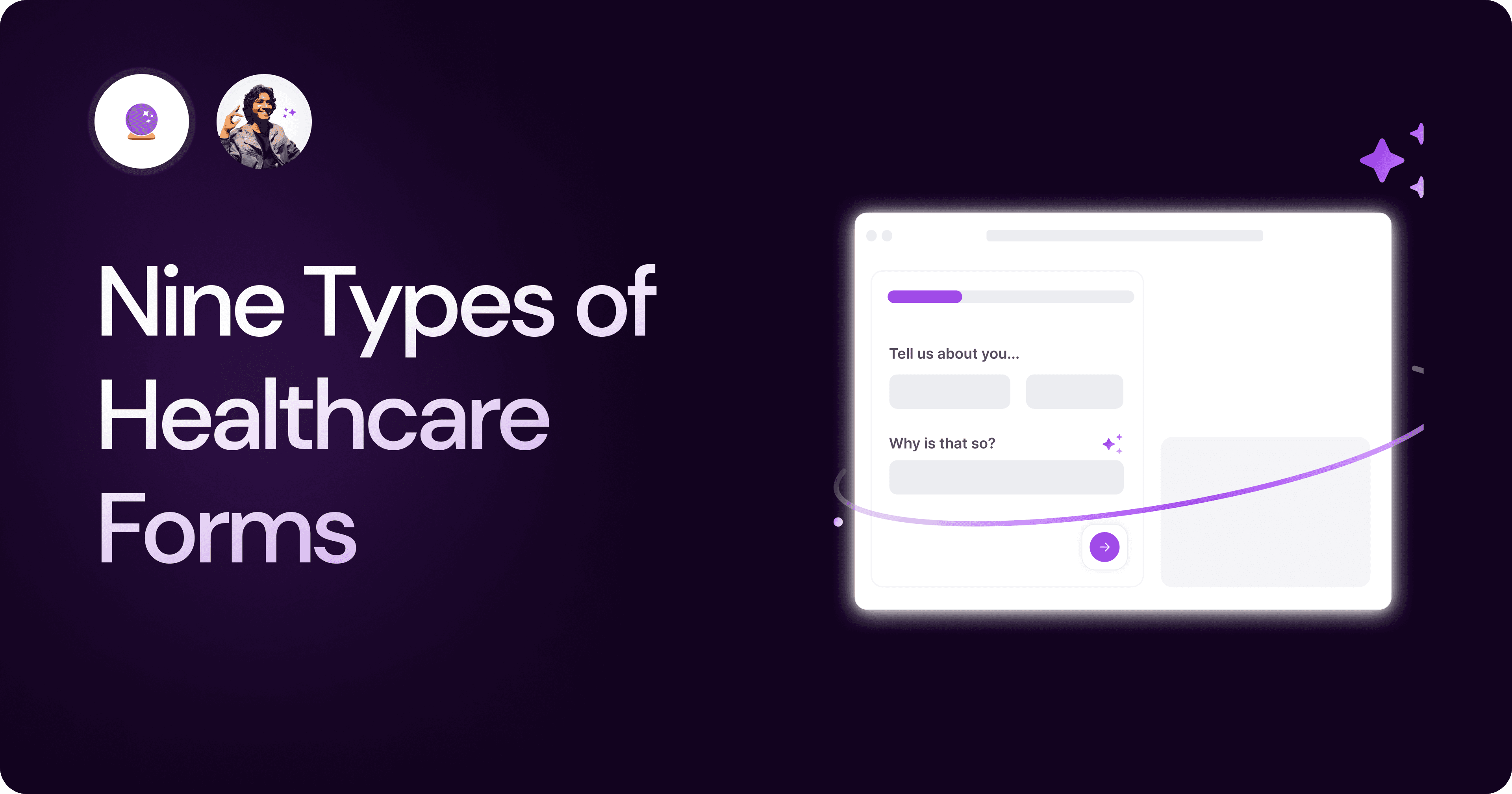
Nine Types of Healthcare and Medical Forms.
Medical forms are a must-have for any healthcare business or practitioner. Learn about the different kinds of medical and healthcare forms.
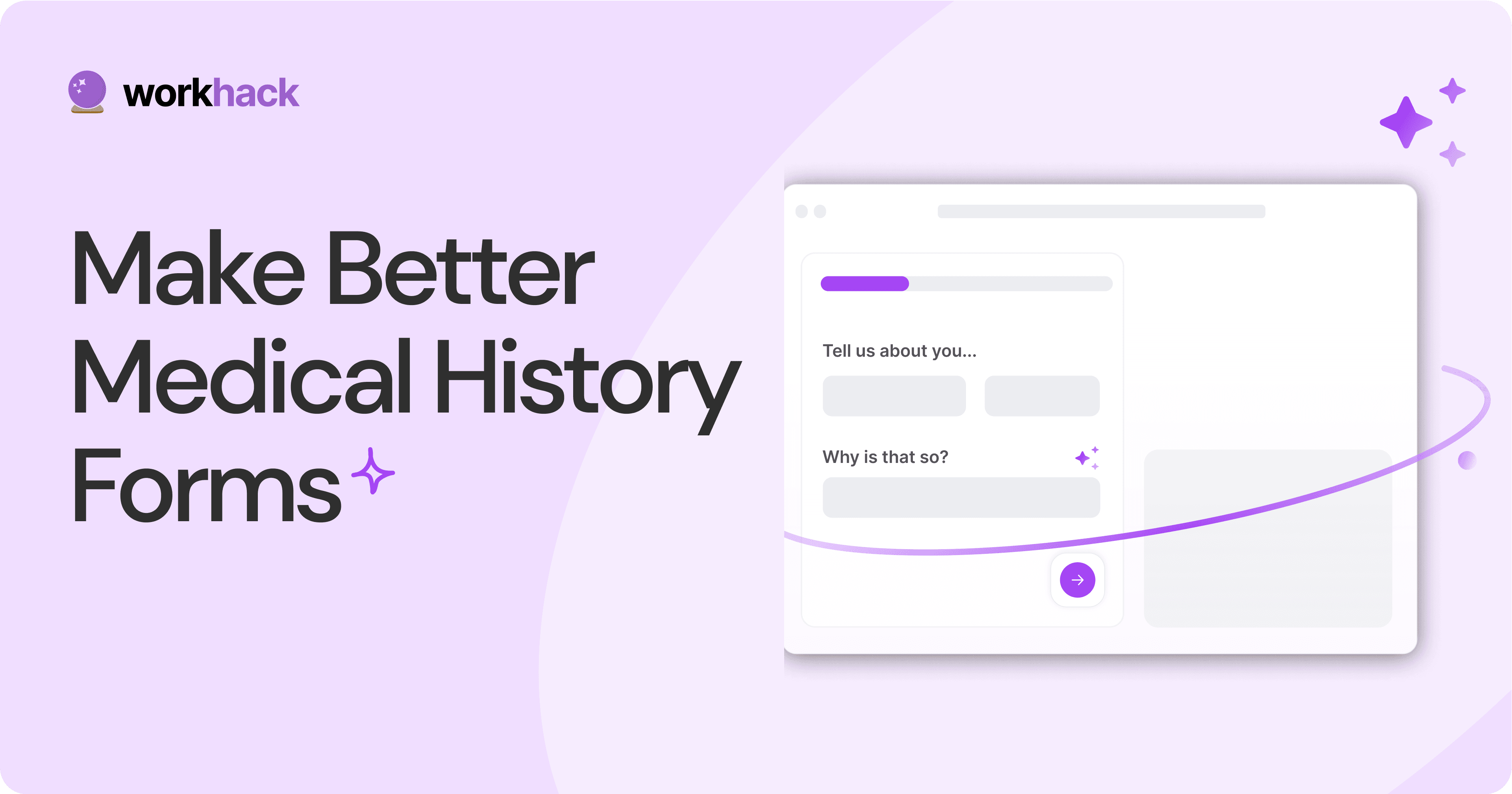
4 Tips for Better Medical History Forms.
Medical history forms are central to patient care, onboarding, and medical administration records. Learn how to make them easier to fill.
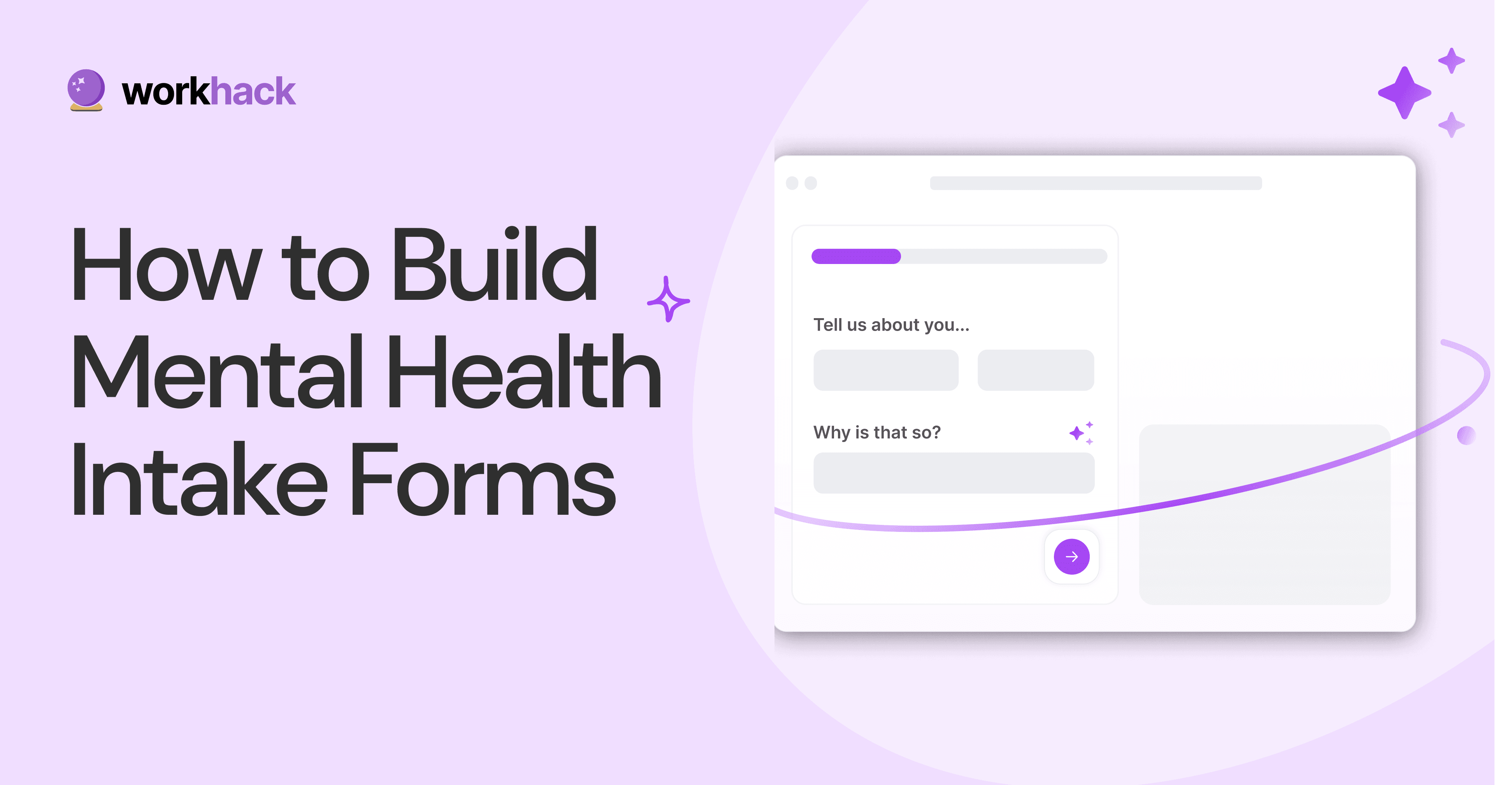
How to Build Mental Health Intake Forms?
Mental health intake forms are not like patient intake forms. Mental health intake forms deal with far more sensitive data and have specific design methods.
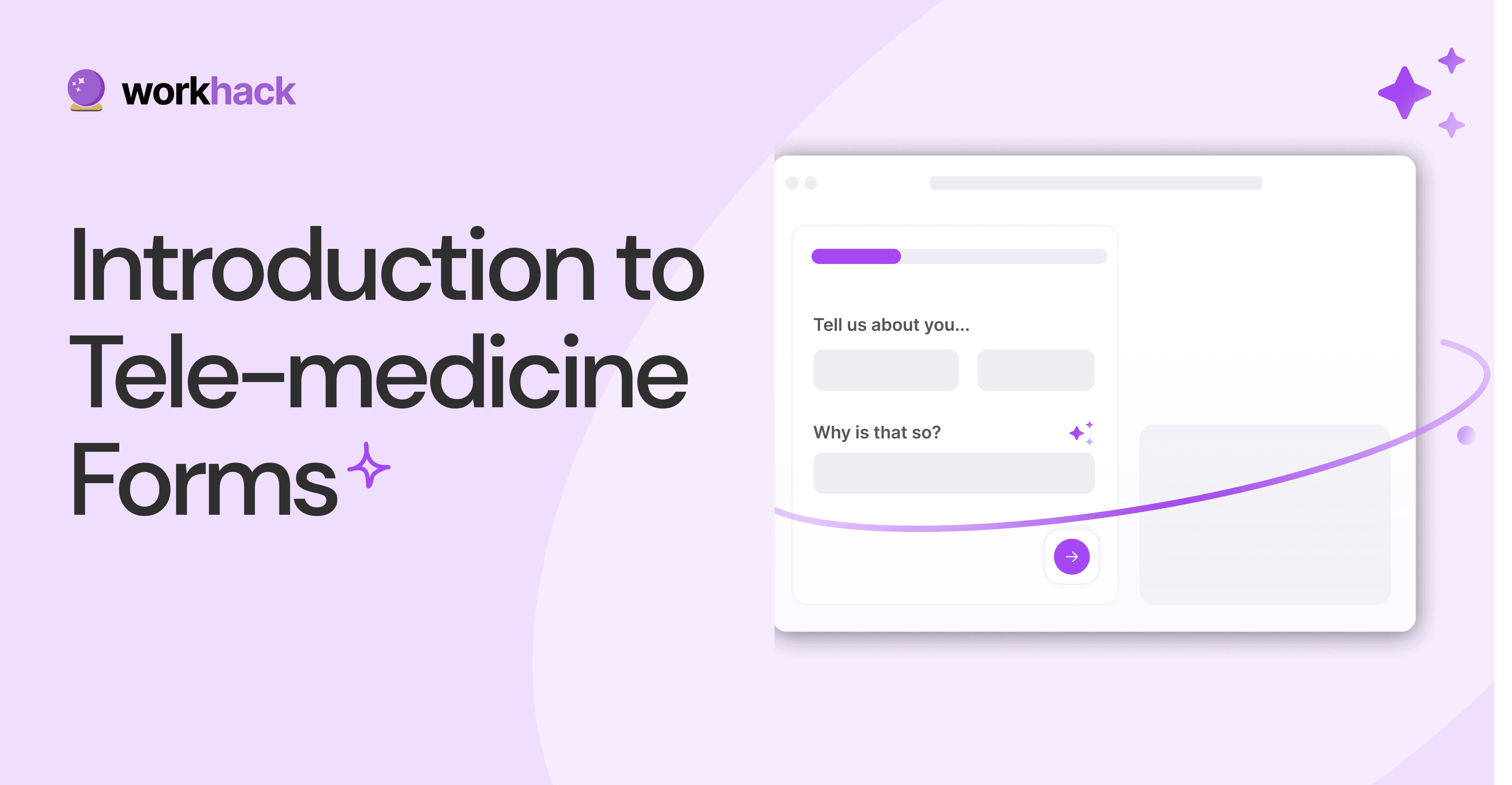
What, Why and How of Telemedicine Forms.
Telemedicine is on the rise and with different form builders out there, which one best suits your needs as a healthcare services provider?
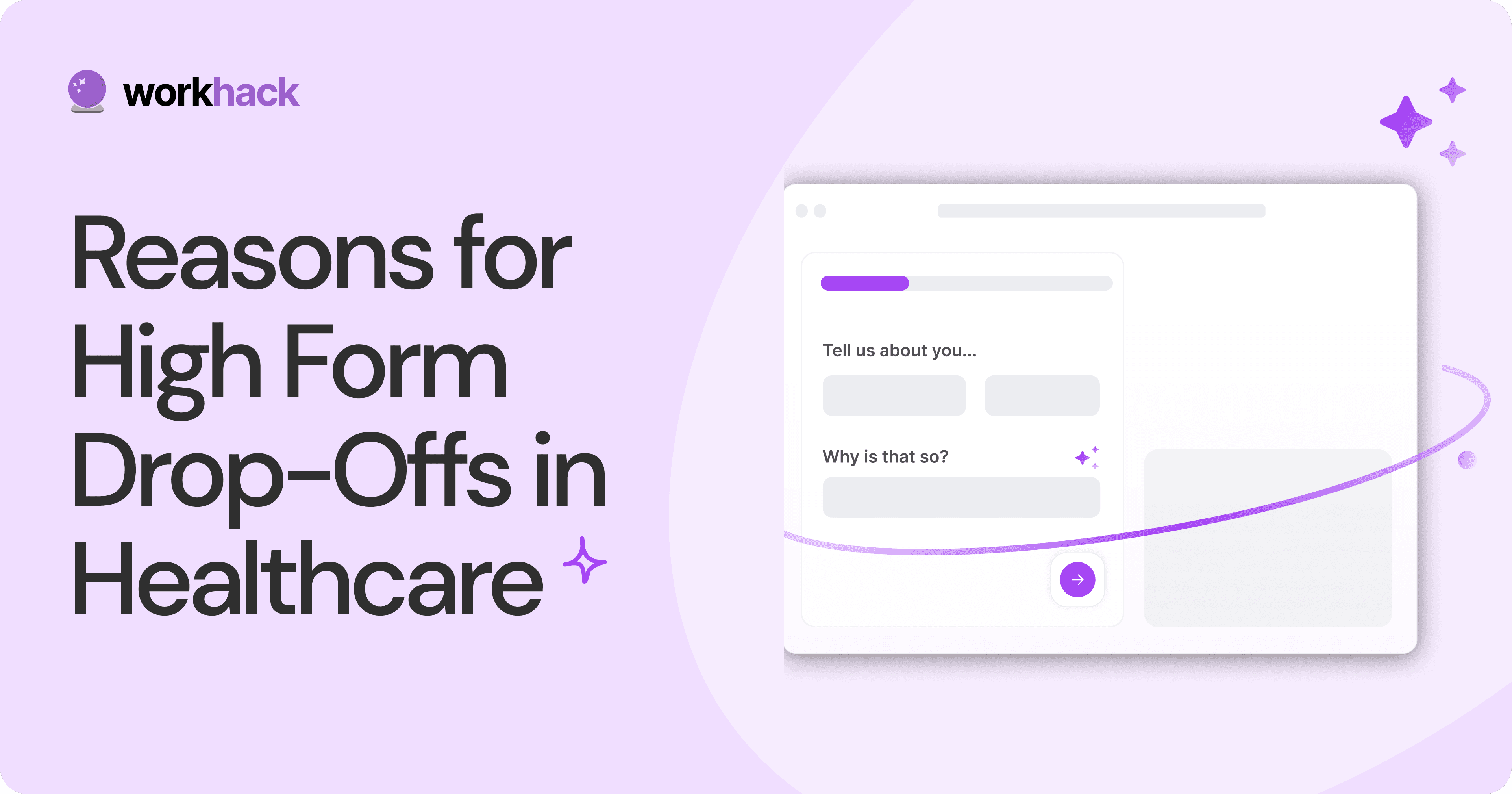
3 Reasons for Major Drop-Offs in Medical Forms.
No matter which healthcare form we pick, there are major drop-off reasons. We shall dive into the top 3 and learn how to resolve them in your next form.
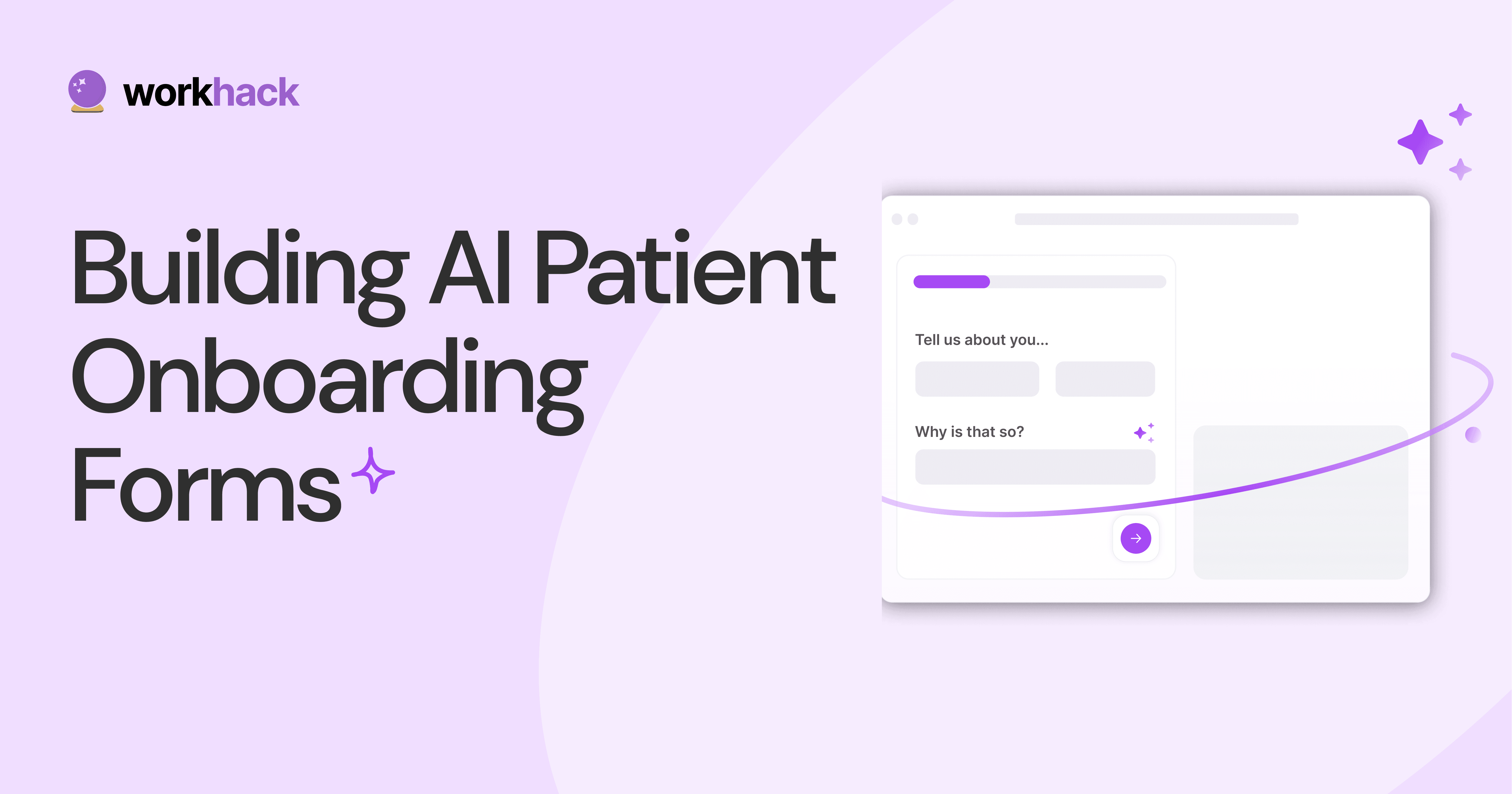
Patient Onboarding Forms - From Click to Clinic.
Patient onboarding forms are the first touchpoint for patients; getting this right for higher conversion rates is a must-have. Learn how to perfect them now.
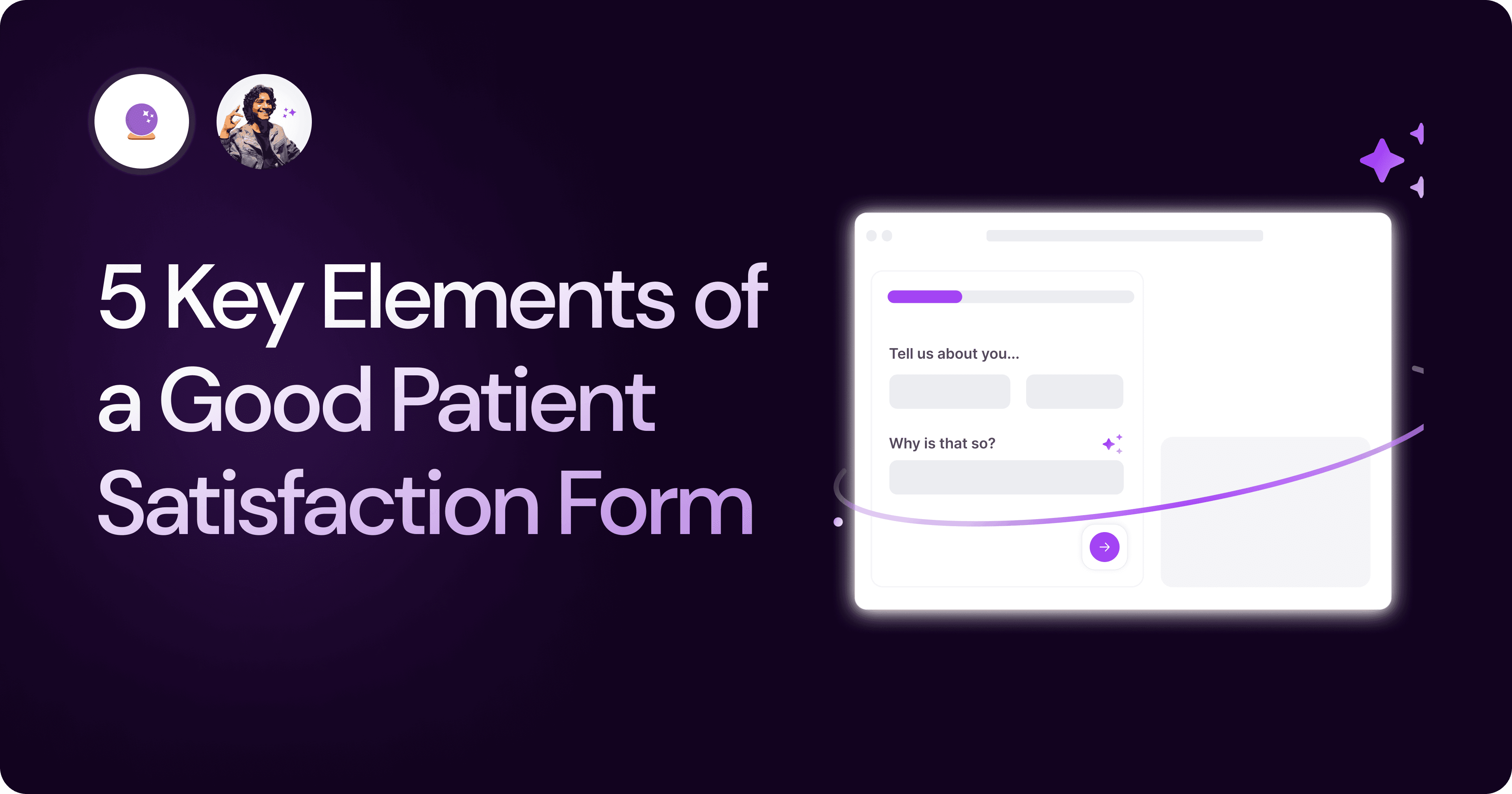
5 Key Parts of a Good Patient Satisfaction Form.
The goal of patient satisfaction surveys is to course-correct the services of a healthcare provider. Patient feedback leads to a culture of patient-centric care.
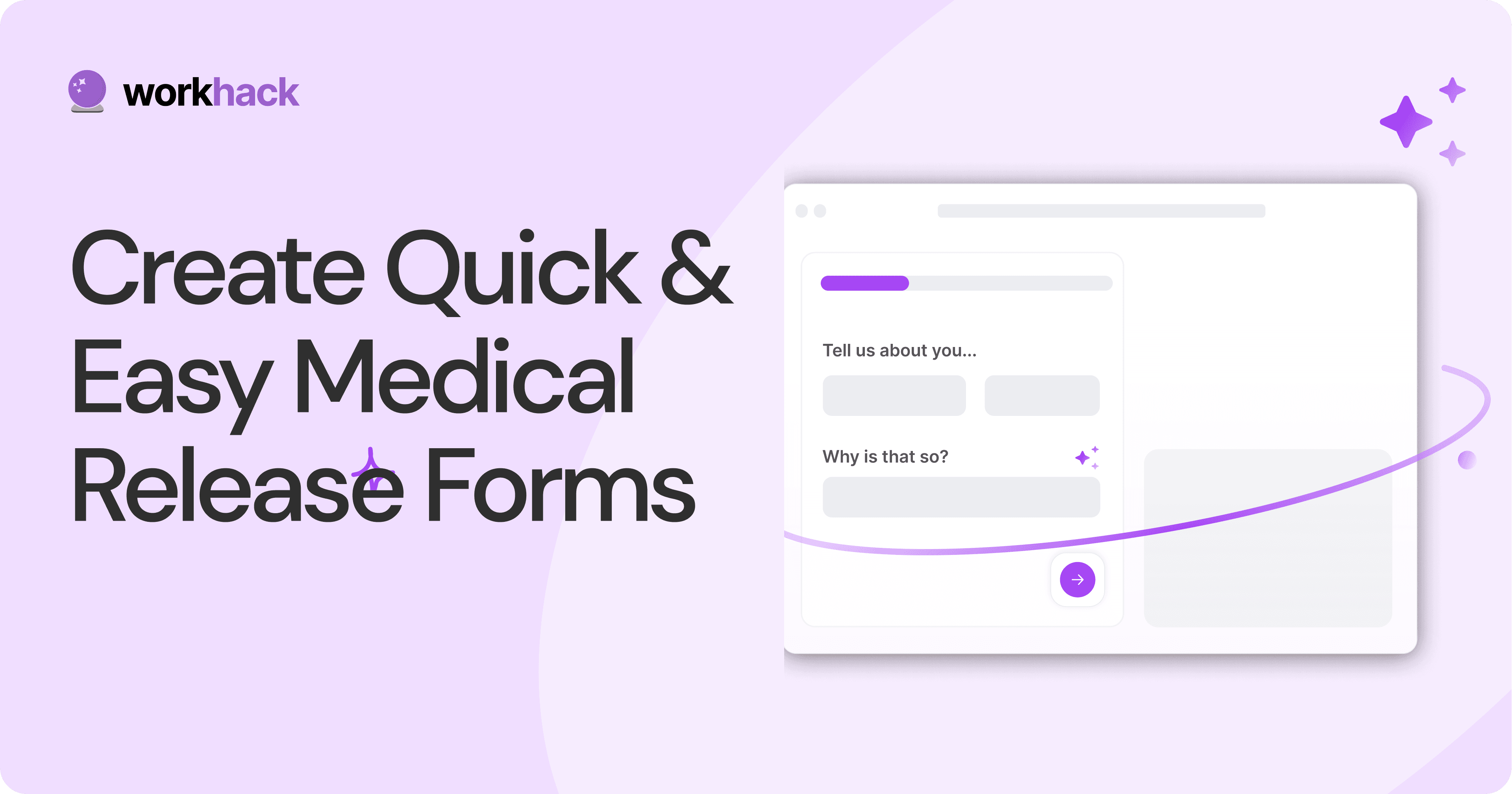
Build Quick and Easy Medical Release Forms.
Every HIPAA-compliant healthcare provider comes across medical release forms that involve details from medical history forms. Can they be shipped fast? Yes.

Nine Types of Healthcare and Medical Forms.
Medical forms are a must-have for any healthcare business or practitioner. Learn about the different kinds of medical and healthcare forms.

4 Tips for Better Medical History Forms.
Medical history forms are central to patient care, onboarding, and medical administration records. Learn how to make them easier to fill.

How to Build Mental Health Intake Forms?
Mental health intake forms are not like patient intake forms. Mental health intake forms deal with far more sensitive data and have specific design methods.

What, Why and How of Telemedicine Forms.
Telemedicine is on the rise and with different form builders out there, which one best suits your needs as a healthcare services provider?

3 Reasons for Major Drop-Offs in Medical Forms.
No matter which healthcare form we pick, there are major drop-off reasons. We shall dive into the top 3 and learn how to resolve them in your next form.

Patient Onboarding Forms - From Click to Clinic.
Patient onboarding forms are the first touchpoint for patients; getting this right for higher conversion rates is a must-have. Learn how to perfect them now.

5 Key Parts of a Good Patient Satisfaction Form.
The goal of patient satisfaction surveys is to course-correct the services of a healthcare provider. Patient feedback leads to a culture of patient-centric care.

Build Quick and Easy Medical Release Forms.
Every HIPAA-compliant healthcare provider comes across medical release forms that involve details from medical history forms. Can they be shipped fast? Yes.

Nine Types of Healthcare and Medical Forms.
Medical forms are a must-have for any healthcare business or practitioner. Learn about the different kinds of medical and healthcare forms.

4 Tips for Better Medical History Forms.
Medical history forms are central to patient care, onboarding, and medical administration records. Learn how to make them easier to fill.

How to Build Mental Health Intake Forms?
Mental health intake forms are not like patient intake forms. Mental health intake forms deal with far more sensitive data and have specific design methods.

What, Why and How of Telemedicine Forms.
Telemedicine is on the rise and with different form builders out there, which one best suits your needs as a healthcare services provider?

3 Reasons for Major Drop-Offs in Medical Forms.
No matter which healthcare form we pick, there are major drop-off reasons. We shall dive into the top 3 and learn how to resolve them in your next form.

Patient Onboarding Forms - From Click to Clinic.
Patient onboarding forms are the first touchpoint for patients; getting this right for higher conversion rates is a must-have. Learn how to perfect them now.

5 Key Parts of a Good Patient Satisfaction Form.
The goal of patient satisfaction surveys is to course-correct the services of a healthcare provider. Patient feedback leads to a culture of patient-centric care.

Build Quick and Easy Medical Release Forms.
Every HIPAA-compliant healthcare provider comes across medical release forms that involve details from medical history forms. Can they be shipped fast? Yes.

Nine Types of Healthcare and Medical Forms.
Medical forms are a must-have for any healthcare business or practitioner. Learn about the different kinds of medical and healthcare forms.

4 Tips for Better Medical History Forms.
Medical history forms are central to patient care, onboarding, and medical administration records. Learn how to make them easier to fill.

How to Build Mental Health Intake Forms?
Mental health intake forms are not like patient intake forms. Mental health intake forms deal with far more sensitive data and have specific design methods.

What, Why and How of Telemedicine Forms.
Telemedicine is on the rise and with different form builders out there, which one best suits your needs as a healthcare services provider?

3 Reasons for Major Drop-Offs in Medical Forms.
No matter which healthcare form we pick, there are major drop-off reasons. We shall dive into the top 3 and learn how to resolve them in your next form.

Patient Onboarding Forms - From Click to Clinic.
Patient onboarding forms are the first touchpoint for patients; getting this right for higher conversion rates is a must-have. Learn how to perfect them now.

5 Key Parts of a Good Patient Satisfaction Form.
The goal of patient satisfaction surveys is to course-correct the services of a healthcare provider. Patient feedback leads to a culture of patient-centric care.

Build Quick and Easy Medical Release Forms.
Every HIPAA-compliant healthcare provider comes across medical release forms that involve details from medical history forms. Can they be shipped fast? Yes.
Subscribe to stay updated.
Subscribe to stay updated.
Subscribe to stay updated.
HC

HC

HC

HC

70+ people from across industries read our emails.
HC

HC

70+ people from across industries read our emails.
HC

HC

HC

70+ people from across industries read our emails.




Bangalore, India / San Francisco, US
WorkHack Inc. 2023
Bangalore, India
San Francisco, US
WorkHack Inc. 2023
WorkHack Inc. 2023
Bangalore, India / San Francisco, US
WorkHack Inc. 2023
Bangalore, India / San Francisco, US



